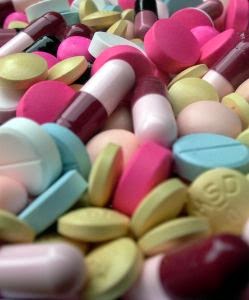According to the latest report published by the Health Survey for
England by the Health and Social Care Information Centre (HSCIC), around
half of women and 43% of men are now taking prescription medications.
The new study – the first of its kind – probed into our nation’s
pill-popping habits, discovering that the most commonly prescribed
medicines are cholesterol-lowering statins
such as atorvastatin and pravastatin (taken by 16% of men and 12% of
women), and drugs for high blood pressure (hypertension) come in at a
close second in the most often prescribed drugs list (taken by 14% of
men and 15% of women).
The HSCIC report represents the very
first nationwide representative assessment of medicines taken by people
in the community, as opposed to within the healthcare system. It
includes both those on long-term drugs and those taking a short course
of antibiotics.
The report states that there were an average of 18.7 prescriptions
administered per person in England during 2013, which reportedly sets
back the NHS more than £15 billion each year.
Unsurprisingly perhaps, the new figures show that there are generally
more prescription drugs taken by people as age increases, with over
half of those aged 65 or over taking three or more medicines and over a
third aged 75 or over take at least six.
Dr Jennifer Mindell, reader in public health at University College
London and one of the authors in the report, argued the statistics
should be taken in context due to the fact people are in better health
than previous times and generally live longer in the modern day,
primarily because of drugs for prevention and treatment of disease.
Dr Mindell commented: “That half of men over 65 are taking
cholesterol-lowering medicines reflects the high risk of cardiovascular
disease in this group. Stopping smoking,
being a healthy weight, eating more vegetables and fruit, and being
physically active reduce people’s risk of these diseases, for people who
want to avoid taking medicines.”
The figures show that almost a third of prescriptions were for
cardiovascular disease, with in excess of 65 million prescriptions given
to combat either high blood pressure, heart failure or high
cholesterol, but excludes the number of people using contraceptives and
smoking cessation products, such as Champix.
The most single prescribed drug was Simvastatin – a cholesterol
lowering treatment – with a staggering 40 million prescriptions given,
followed by aspirin (31 million).
Antidepressant drugs were found to be taken by over one in 10 women –
this is double the figure for men. These types of drugs were often
taken by middle-aged women and those from the poorest regions of the
country. It was found 17% of the poorest women were on antidepressants
compared to 7% of the richest women.
Dr Sarah Jackson, at University College London, said: “It’s well
known that rates of depression are much higher among women than men, so I
am not surprised to see that antidepressant use follows the same
pattern in this study. People with depression are less likely to be in
regular employment, and people who are unemployed or in low paid jobs
are more likely to have depression.”
In addition, the reported highlighted the fact that overweight and
obese people were more probably going to be taking prescription
medication, with over half of severely obese people across England
taking at least one prescription drug and a third taking at least three.
Sue Faulding, a pharmacist and programme manager of prescribing and
primary care services at the HSCIC, commented: “Obesity is often
associated with high cholesterol, high blood pressure, joint pain and
depression. Lifestyle changes are always recommended in the first
instance, but medicines can help to address the symptoms and this study
shows that medicine use increases steadily with body mass index.”


No comments:
Post a Comment